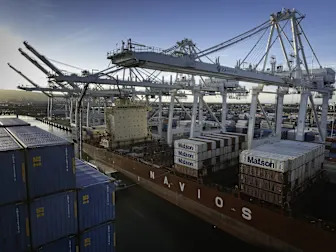(Bloomberg) -- US states and small businesses that won a ruling that most of President Donald Trump’s global tariffs are illegal want them blocked during the administration’s appeal, saying they’re suffering immediate harm from economic uncertainty around the levies.
In Monday filings in the US Court of International Trade, which last week ruled that Trump exceeded his authority in imposing his broad April 2 “Liberation Day” trade levies, the businesses and states opposed the administration’s request that the tariffs remain in place during its appeal.
It’s unclear what effect a ruling by the trade court on the stay request would have. The government has separately asked the US Court of Appeals for the Federal Circuit for the same thing. The appellate process will likely continue for months, so a pause that long would be a win for the White House. Meanwhile, the trade court’s May 28 ruling remains temporarily paused by the appeals court, which has asked for briefs by June 9.
The small businesses said the costs and risk are adding up and could even lead to bankruptcies.
“Many other businesses are suffering and will continue to suffer from the Liberation Day tariffs if a stay is granted,” the businesses, led by New York wine importer V.O.S. Selections Inc., said. “Small businesses are particularly vulnerable, as they are less equipped to absorb these extra costs.”
The administration has said it will ask the Supreme Court to intervene if it doesn’t get the ruling put on hold during the appeal. The US Justice Department argued in court filings that the trade court’s decision was harming US diplomacy and intruding on Trump’s exclusive authority to conduct foreign affairs.
In their filing, the small businesses said there was no equivalence between the harms being suffered.
Trump “is not harmed by the denial of authority he does not legally possess, nor is he harmed by courts holding him to the statutory requirements Congress imposed,” the group said. “And a stay would cause irreparable harm not only to the plaintiffs, but to thousands of businesses and millions of consumers across the country.”
A separate filing by Oregon Attorney General Dan Rayfield on behalf of a dozen Democratic-led states pointed out that Trump administration officials have consistently downplayed the impact of the trade court’s ruling in public appearances by saying tariffs can still be imposed through other means.
“Top administration officials explained that other countries recognized the underlying threat of tariffs remained through other mechanisms that remain untouched by the court’s ruling,” the states said, adding, “That alone is reason to deny a stay pending appeal.”
The administration has suggested that businesses could be issued tariff refunds if the trade-court ruling is ultimately upheld on appeal, but the businesses on Monday called the idea “insulting.”
In a ruling that took many by surprise, a three-judge panel of the trade court held that Trump wasn’t given unlimited tariff power by a 1977 emergency law. The decision was handed down in a pair of related suits filed by a group of small businesses and about a dozen Democratic-led states. The states are expected to file a similar brief later on Monday.
The May 28 trade court ruling was one of the biggest legal setbacks for Trump amid a wave of lawsuits over executive orders testing the limits of presidential power. Others are challenging Trump’s mass firings of federal workers, restrictions on birthright citizenship and efforts to slash federal spending already approved by Congress.
(Updates with states’ filing. A previous version of this story corrected the deadline for appeals court filings.)


